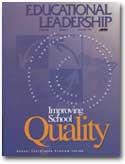Grammar Not a Criterion of Science Assessment
Our colleagues at the California Assessment Program (CAP) have been receiving calls from readers wondering whether students' scores on exercises designed to assess scientific problem solving depend upon their ability to write grammatically correct sentences (“What We've Learned about Assessing Hands-On Science,” May 1992). Nothing could be farther from the truth.
In our article we quoted a teacher who, under the impression that grammar was an unstated criterion, admonished her students to “write in complete sentences or the state will grade you down.” After rescoring 600 notebooks with the CAP's four-point rubric, we can assure readers that while the rubric takes into consideration a student's ability to communicate understanding of scientific concepts through writing, drawing, and manipulation of data, grammatical correctness has no bearing on whether the student gets full credit.
CAP assessments follow recommendations from the California Science Framework and provide students opportunity to investigate scientific problems in an integrated context. We certainly would not want CAP, a leader in science assessment, to be unfairly evaluated.
—Richard J. Shavelson, Gail P. Baxter, University of Santa Barbara, Santa Barbara, California
Gay Teens At Risk
I appreciated Alex Molnar's commentary (“Too Many Kids Are Getting Killed,” September 1992).
The epidemic proportions of violence in American society beget yet more tragedy when young people turn that violence against themselves. Yesterday, Labor Day, a young man used a shotgun to commit suicide; he was a sophomore at Carmel High School. Perhaps that is why, today, when I read your piece it struck me so forcefully.
Also, I recently completed a manuscript for Phi Delta Kappa entitled “Gay Teens At Risk,” which examines another aspect of our violent society. Not only are teens who are struggling to come to grips with their sexual orientation at risk of school failure in an atmosphere of alienation and rejection; not only are homosexual teenagers at greater risk of AIDS than heterosexual teens; gay teens also account for 30 percent of all teen suicides—a far higher proportion than they represent in the teen population. This, too, I believe exemplifies “a terrible anti-child bias of our culture.”
—Donovan R. Walling, Director of Instructional Services Carmel Clay Schools Carmel, Indiana
